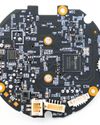
I've been writing occasionally about sensors, this article is about electronic compasses. With modern GPS, it's easy to keep track of where you are, and a GPS can even tell you the direction you are moving - as long as you're moving. Some handheld hiking GPS units have a built-in electronic compass because GPS gives you your position but can only tell direction if you are moving; I have a hiking GPS with a built-in compass.
A lot of cars contain a compass with the direction displayed either on the dashboard or in a corner of the review mirror.
Handheld mechanical compasses have been around for centuries, of course. I still have one in my hiking backpack. A compass can be affected by nearby metal and other interfering items. I had a compass in a car years ago that tended to point to the engine block rather than pointing north. Mechanical compasses are also prone to break and obviously can't be incorporated into a vehicle dashboard display.
Sailing ships with steel hulls and mechanical compasses have historically had steel balls and compensating magnets to adjust for the magnetic effects of the ship's hull.
Normally a mechanical compass points to the north pole the magnetic north pole.
The magnetic north pole isn't quite the same as the geographical north pole. Sometimes it doesn't matter because you are using a compass to navigate between two visible points. Or else you just want a general north/ south indication, like the way the compass in a car just gives you a general direction at the 8 points of the compass (N, NE, E, etc.). But sometimes you want to know where true north is, and you want more precision than the 8 compass points. This is especially important in aviation. Of course, modern airplanes use GPS for navigation, but the FAA still requires a compass as a backup instrument.
DECLINATION
This story is from the August 2024 edition of Circuit Cellar.
Start your 7-day Magzter GOLD free trial to access thousands of curated premium stories, and 9,000+ magazines and newspapers.
Already a subscriber ? Sign In
This story is from the August 2024 edition of Circuit Cellar.
Start your 7-day Magzter GOLD free trial to access thousands of curated premium stories, and 9,000+ magazines and newspapers.
Already a subscriber? Sign In

New TI MCUs Enable Edge AI and Industry-Leading Real-Time Control to Advance Efficiency, Safety, and Sustainability
Texas Instruments (TI) introduced two new series of real-time microcontrollers that deliver advancements to help engineers achieve more intelligent and secure processing in automotive and industrial applications.

Using Amazon Alexa to Control Custom IoT Gadgets
In part two of his article, Brian describes integrating custom IoT gadgets with Amazon Echo using emulation to receive spoken alarms. In part one, he used emulation and Arduino Cloud services as a middleman.

Holiday Hangover Hardware Hacking
Having too much cheer during the holidays? In this month's article, Colin offers a diversion from the jolly season by urging developers to retreat to the basement to brush up on hardware hacking skills. He shows how a low-cost Raspberry Pi Pico and a TP-Link Tapo C200 smart IP camera could become the next automated bird deterrent or a home automation server.

Datasheet: Microamps Per Megahertz Ultra-Low Power MCUs Minimize Current Consumption
How do chip makers differentiate if many ultra-low power MCUs on the market feature the same processor core? The peripherals and different power states offer various ways to manage current consumption down to microamps per megahertz.

Smart Home Lock Down Matter Provides Security Blanket
As more devices in the smart home connect to the Internet, they become increasingly vulnerable to outside attacks. Developers can now add the latest security measures to their Smart Home devices through Matter.

Basic Pulse Circuits
In part one of a three-part series, Wolfgang wrote how basic pulse circuits help digital circuits, such as embedded boards with ARM processors, deal with pulse trains or bursts of pulses from the outside. In Part 2, he dives into enabling flip-flops, timing parameters, and synchronization, design tasks needed to capture, detect, and filter pulses.

Building a Wi-Fi Router Watchdog
Dev created a watchdog for a Wi-Fi extender using a Raspberry Pi Pico. This monitors Wi-Fi connectivity for his smart home lighting system, which would require a reset twice a year due to rapid power interruptions.

Create Your Own PCBs with a CNC Milling Machine
Using KiCad, CopperCAM, and Candle Software

Performance Bottlenecks in Embedded Linux Solutions Analysis, Identification, and Mitigation
Good performance is a requirement for every technology, and system designers rely on operating systems to ensure fast and smooth transitions in critical applications. Fortunately, Pedro writes, the embedded Linux OS offers ways for finding, analyzing and mitigating performance bottlenecks so embedded systems can deliver the speed and efficiency that end users expect.

Renesas New RA8 Entry-Line MCU Groups Brings High Performance of Arm Cortex-M85 Processor to Cost-Sensitive Applications with Market-Leading CoreMark Performance
Renesas Electronics Corp., a premier supplier of advanced semiconductor solutions, introduced the RA8E1 and RA8E2 microcontroller (MCU) groups, extending the industry's most powerful series of MCUs.